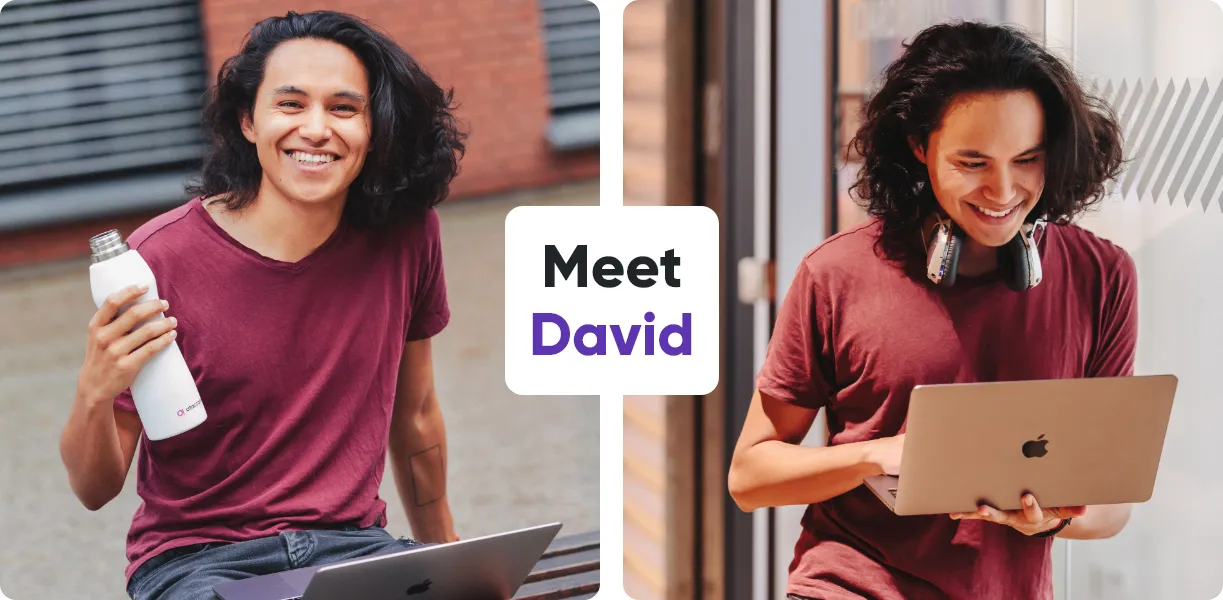After giving you an inside look at what it’s like to work on the features of the Ataccama ONE platform, we wanted to introduce you to another important role in the front-end engineering department — Platform Engineers. From building and operating the core of our platform to ensuring that development teams can deliver the different features they’re working on, Front-End Platform Engineers are critical for Ataccama’s success. So, what goes on in the day-to-day life of these engineers? And what makes Ataccama ONE a complex (and rewarding!) product to work on? Our new engineer, David, tells all.
How did you come to be at Ataccama?
I moved to Prague from Bogota in November of 2018. I had graduated and basically started sending CVs everywhere. Eventually, Kiwi offered me a position, and I just took the leap. I knew I wanted to live in Europe, so I thought it was a great opportunity. I moved to Prague and spent two years there. Then it was time to move on to more challenging stuff. The opportunity with Ataccama came up when a recruiter reached out to me. The product seemed complex, so I was excited to tackle a new challenge.
What’s the day-to-day life of a Front-End Platform Engineer like?
Right now we’re working on a very specific future feature — upgradeability. But in general, what the role consists of is taking care of the core of the platform, and making sure that the other teams have what they need in order to deliver their features. The front-end application itself is a framework where we can manage the metadata of any customer.
It’s a long-term initiative that we want to make as short term as possible. Upgrading between versions of Ataccama ONE is a big pain point for our consultants and clients. It usually takes a week, and they need to have help from developers, and it’s a bit of a mess. What we’re trying to do is fast track the process and automate everything that can be automated, so that it can be done without intervention from developers or consultants. Ideally, the customers should be able to do it themselves. Maybe that’s a bit idealistic, but the consultants should at least be able to do it on their own.
What’s been the biggest challenge for you in your first six months?
Just getting used to such a complex code base like the Ataccama ONE Gen2 platform. It’s really not like a traditional front-end application. It has multiple layers of abstraction that you have to get comfortable with before becoming proficient at bug fixing and coding a feature. So just getting used to that and changing your way of thinking are the hardest challenges.
What’s the best part of working as a Front-End Platform Engineer at Ataccama?
“It’s not even just the impact on the application and company, but on the world in general because this product is eliminating a lot of manual work. The way I see it reducing the need for manual work in society is great because it frees people to focus on the things that matter.”
The product has proved to be quite challenging and complex so far which I really like. I get to be an active participant and feel like my opinion matters. My impact is really visible across the application, and the company in general, which is great to see.
It’s not even just the impact on the application and company, but on the world in general because this product is eliminating a lot of manual work. The way I see it reducing the need for manual work in society is great because it frees people to focus on the things that matter.
What have you learned since joining Ataccama?
Tons. In terms of technical knowledge, I’ve definitely learned a lot, and I’ve also improved my soft skills by talking to other developers and QA. I try to make communication as efficient as possible to make sure we don’t go in circles and really focus on being assertive and concise. I wouldn’t say that’s necessarily something that I learned here, but it’s something that I’ve been able to actively try to improve while working at Ataccama.
One of the really cool things I’ve learned is how abstract and dynamic an app can be. In Ataccama ONE Gen2, pretty much everything is configurable or customizable. This means that the app is more of a meta app that generates the real app on the fly based on the client’s configuration and data model. Dealing with such a complex app has taught me countless lessons, both technically and in relation to the product.
Why do you think candidates would be interested in working as a Front-End Platform Engineer at Ataccama?
Solving hard technical challenges not only helps you grow professionally, but it also gives you a great deal of satisfaction. Working closely with passionate and talented people is very encouraging, and also a fantastic learning opportunity. Also, as a platform engineer, you get to exercise your creativity not only to come up with interesting technical solutions, but to influence the product and the way that users interact with it.
What advice would you give someone who wants to join Ataccama’s engineering department?
Don’t be scared.
Because the code base can be quite intimidating in the beginning. I would advise people not to rush into trying to understand everything at once and to pace themselves. It’s normal not to understand everything in the first month, the second month, or maybe even the third. Just know that the learning process is gradual and don’t freak out about not knowing all the acronyms and all the inside stuff. Take it easy. Take your time.
Has anything surprised you?
“You can really feel the energy in the company. When I joined, I wasn’t thinking about that, so it was a nice surprise to see this level of enthusiasm in my colleagues.”
I wouldn’t say it’s a surprise, but it’s something that I really appreciate. There are really enthusiastic and passionate people here who really want to make the product better. You can really feel the energy in the company. When I joined, I wasn’t thinking about that, so it was a nice surprise to see this level of enthusiasm in my colleagues.
What books, blogs, podcasts or other resources would you recommend to someone who’s interested in the work you do?
I recommend the Soft Skills Engineering podcast. It provides a lot of good advice on the non-technical issues that we face on a daily basis. The Software Engineering Radio and Javascript Jabber podcasts are also good listens.
As for the technical side of things, I really like the book The Pragmatic Programmer, which gives you a lot of useful principles that I keep in mind pretty much any time I’m coding. Deep Work by Cal Newport is also a good resource for learning how to be productive without spending all your time at work. Regarding blogs, I follow the work of Kent C. Dodds, Dan Abramov, Shawn Swyx, and a few other relevant people in the community.
What do you like to do for #ChallengingFun out of the office?
I like to find new ways of working out. I started doing hot yoga and I also tried Muay Thai, a martial art from Thailand. I try to be an active person.
I also like putting myself in really awkward situations where I’m not comfortable. I believe that when you’re not comfortable that’s when you have the opportunity to really grow. Lately, I’ve been trying out stand-up comedy because I’ve always liked to make jokes and recently I found out about some open mic events and just thought yeah let’s try it out. I’ve been doing it for about a month and half now. It definitely makes you feel really, really uncomfortable, but there’s great value in doing #ChallengingFun stuff. And it’s really fun! I really like doing the hard stuff in both my personal and professional life.
Interested in challenging yourself with a complex and innovative product? Want to see firsthand how your ideas can become a reality? Joining the engineering team at Ataccama might be the challenge you’re looking for! Check out our open positions at jobs.ataccama.com and apply today!
Want to learn more about our engineering team and how it works? Meet our Head of Engineering to find out why he joined Ataccama and his plans for the future of the department.

